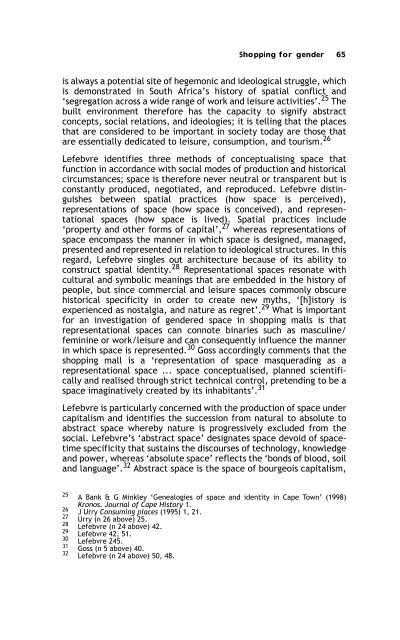Sex, Gender, Becoming - PULP
Sex, Gender, Becoming - PULP
Sex, Gender, Becoming - PULP
Create successful ePaper yourself
Turn your PDF publications into a flip-book with our unique Google optimized e-Paper software.
Shopping for gender 65<br />
is always a potential site of hegemonic and ideological struggle, which<br />
is demonstrated in South Africa’s history of spatial conflict and<br />
‘segregation across a wide range of work and leisure activities’. 25 The<br />
built environment therefore has the capacity to signify abstract<br />
concepts, social relations, and ideologies; it is telling that the places<br />
that are considered to be important in society today are those that<br />
are essentially dedicated to leisure, consumption, and tourism. 26<br />
Lefebvre identifies three methods of conceptualising space that<br />
function in accordance with social modes of production and historical<br />
circumstances; space is therefore never neutral or transparent but is<br />
constantly produced, negotiated, and reproduced. Lefebvre distinguishes<br />
between spatial practices (how space is perceived),<br />
representations of space (how space is conceived), and representational<br />
spaces (how space is lived). Spatial practices include<br />
‘property and other forms of capital’, 27 whereas representations of<br />
space encompass the manner in which space is designed, managed,<br />
presented and represented in relation to ideological structures. In this<br />
regard, Lefebvre singles out architecture because of its ability to<br />
construct spatial identity. 28 Representational spaces resonate with<br />
cultural and symbolic meanings that are embedded in the history of<br />
people, but since commercial and leisure spaces commonly obscure<br />
historical specificity in order to create new myths, ‘[h]istory is<br />
experienced as nostalgia, and nature as regret’. 29 What is important<br />
for an investigation of gendered space in shopping malls is that<br />
representational spaces can connote binaries such as masculine/<br />
feminine or work/leisure and can consequently influence the manner<br />
in which space is represented. 30 Goss accordingly comments that the<br />
shopping mall is a ‘representation of space masquerading as a<br />
representational space ... space conceptualised, planned scientifically<br />
and realised through strict technical control, pretending to be a<br />
space imaginatively created by its inhabitants’. 31<br />
Lefebvre is particularly concerned with the production of space under<br />
capitalism and identifies the succession from natural to absolute to<br />
abstract space whereby nature is progressively excluded from the<br />
social. Lefebvre’s ‘abstract space’ designates space devoid of spacetime<br />
specificity that sustains the discourses of technology, knowledge<br />
and power, whereas ‘absolute space’ reflects the ‘bonds of blood, soil<br />
and language’. 32 Abstract space is the space of bourgeois capitalism,<br />
25 A Bank & G Minkley ‘Genealogies of space and identity in Cape Town’ (1998)<br />
Kronos. Journal of Cape History 1.<br />
26 J Urry Consuming places (1995) 1, 21.<br />
27 Urry (n 26 above) 25.<br />
28<br />
Lefebvre (n 24 above) 42.<br />
29 Lefebvre 42, 51.<br />
30 Lefebvre 245.<br />
31<br />
Goss (n 5 above) 40.<br />
32 Lefebvre (n 24 above) 50, 48.
















